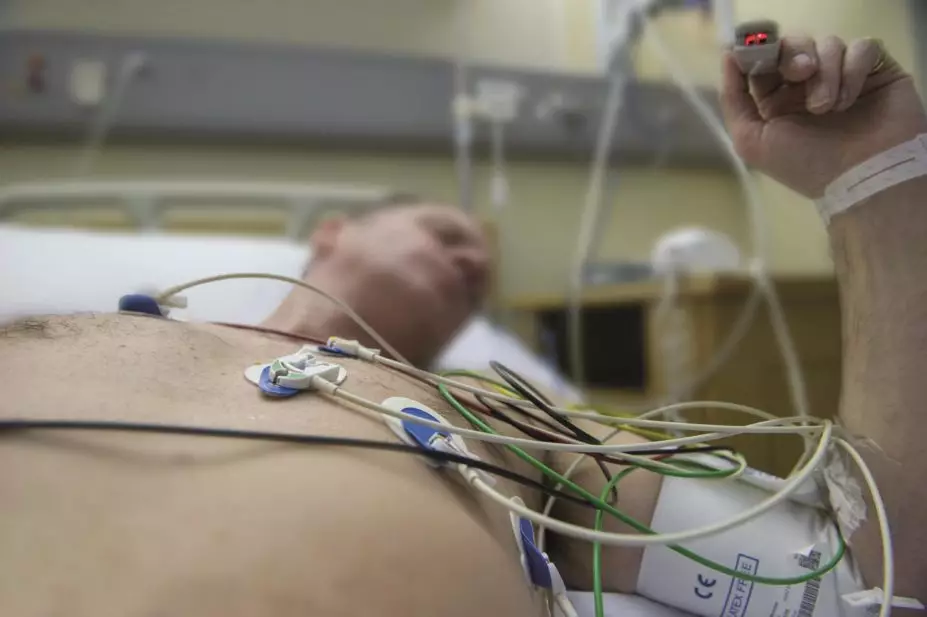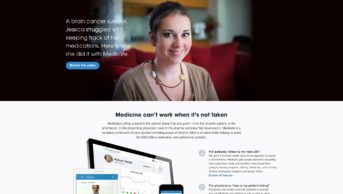
Nick Moore / Alamy
Some patients who survive a heart attack fail to take the drugs they are prescribed after being discharged from hospital, a large US study[1]
has found.
Researchers followed up 7,425 patients enrolled in the Treatment with ADP Receptor Inhibitors: Longitudinal Assessment of Treatment Patterns and Events after Acute Coronary Syndrome (TRANSLATE-ACS) study, who received angioplasty (percutaneous coronary intervention) to unblock arteries after a myocardial infarction, to assess compliance with their cardiovascular medicines. Patients were treated at 216 US hospitals between April 2010 and May 2012.
Six weeks after the heart attack, 71% said that they consistently took the drugs as prescribed, 25% said they were moderately adherent with their drugs and 4% said they rarely took them.
What was most concerning, the researchers report, was that one third of the patients who rarely took their drugs reported missing doses of antiplatelet therapy at least twice a week. Patients with signs of depression and those who reported financial hardship because of the expense of medication were both more likely not to adhere with their treatment.
Forgetfulness was the most common reason for not taking medicines and cited by 82% of patients with low adherence. Almost half of patients who rarely took their medicines (47%) said sticking with their treatment plan “was a hassle”, 20% said that they might cut back or stop taking their medicine without telling their doctor because it made them feel worse, and 12% reported they would stop taking their medication because they felt like their heart condition was under control.
The researchers looked at whether there was an association between low medication adherence and risk of death or readmission to hospital three months after the heart attack, but the association was not significant (adjusted hazard ratio, 1.35; 95% confidence interval, 0.98–1.87).
Conversely, patients were more likely to report that they were adhering to their medication six weeks after their heart attack if follow-up appointments had been made for them before discharge.
“Lack of contact represents a lost opportunity not only for reinforcing continued treatment goals but also for assessing medication intolerance and patient knowledge gaps that might contribute to non-adherence,” say the researchers.
Patients were also more likely to adhere with their medication if they understood why they were taking the drugs and had been warned about any potential side effects.
“Patients who had low adherence cited poor communication of the need and reasons for each of the discharge medications, as well as the possible side effects that they may encounter,” say the researchers. “Our study also shows the importance of assessing health literacy when disseminating written patient instructions and educational materials.”
Sotiris Antoniou, consultant pharmacist in cardiovascular medicine at Barts Health NHS Trust in London and a spokesperson for the Royal Pharmaceutical Society, says the results reflect other findings.
“Evidence suggests that a third to a half of patients with long term conditions do not take their medicines as intended,” he says, and studies on patient beliefs have indicated that to increase the likelihood of adherence, health professionals need to ensure that patients’ understanding of the necessity for treatment outweigh any concerns, such as about side effects.
“The NHS is almost too effective in the management of myocardial infarction in that the median length of stay is now just two to three days, which makes it very difficult for hospital pharmacists to counsel patients on secondary prevention medication.”
Maureen Talbot, senior cardiac nurse at the British Heart Foundation, a charity, says: “The importance of providing timely education and support following a heart attack is evident to reduce the risk of relapse, depression and ensure patients are taking their medications as prescribed. Increased adherence to prescribed medications will reduce the risk of having another heart attack.”
References
[1] Mathews R, Peterson ED, Honeycutt E et al. Early medication nonadherence after acute myocardial infarction. Insights into actionable opportunities from the treatment with ADP receptor inhibitors: longitudinal assessment of treatment patterns and events after acute coronary syndrome study. Circulation Cardiovascular Quality and Outcomes 2015. doi:10.1161/CIRCOUTCOMES.114.001223.


